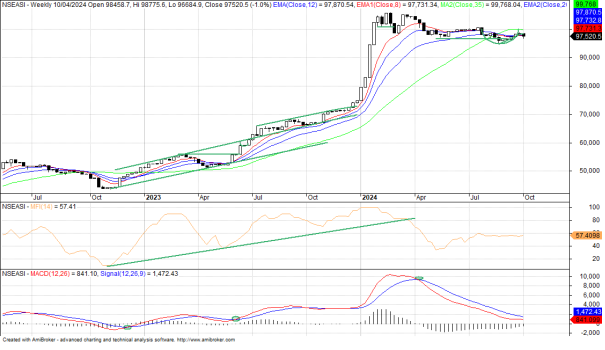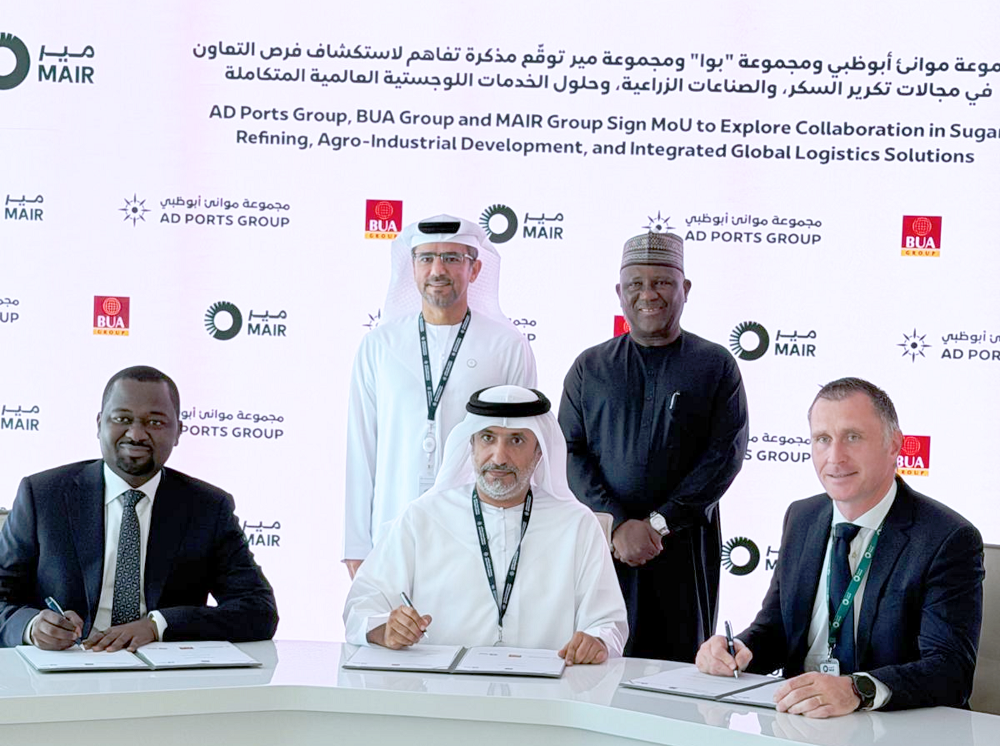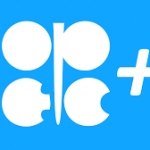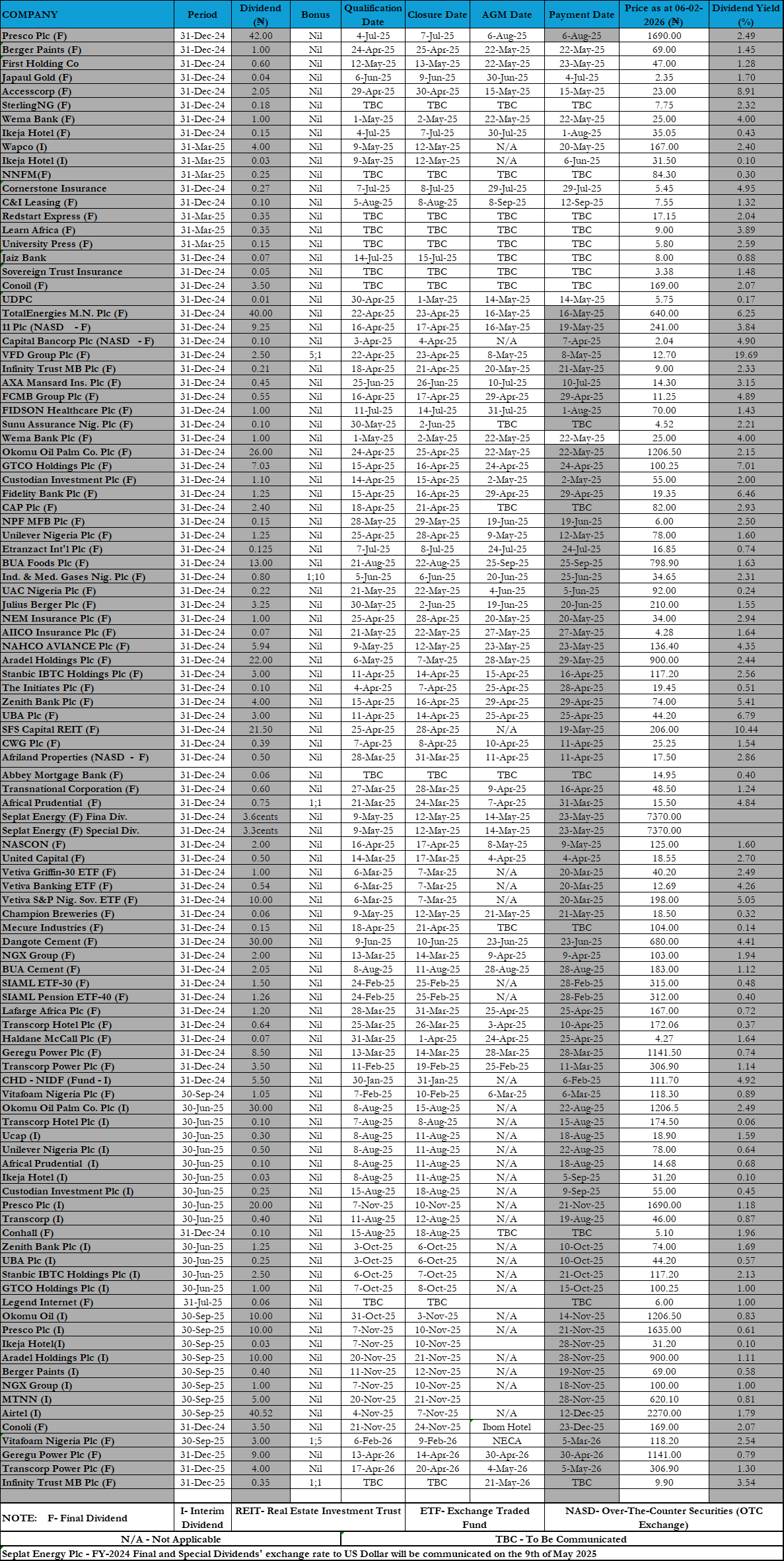
Trading for the week ended October 4, 2024 closed on the Nigerian stock market, with mixed results, after four trading days following the national day celebration on on Tuesday. The market saw gains and losses in two sessions each, shedding a cumulative 0.95% on its benchmark All-Share Index which closed at 97,520.54 basis points. Within the period also, Market Capitalization closed at N56.039tr. This downturn reflects the broader economic environment, and its impact on investor sentiment, given the volatile conditions both domestically and globally.
Of the 151 companies listed on the NGX, 45 recorded various level of appreciation in their prices, while 33 suffered loss during the week, leaving 73 others unchanged. One major contributors to the market’s decline was the performance of listed companies in the Dangote Group consisting of Dangote Cement, Dangote Sugar, and Nascon. Dangote Sugar’s share price lost 12.20%; ahead of the 10% decline by Dangote Cement, with Nascon shedding 9.09%.
NGXASI Weekly Chart
Technically speaking, the persistent rise in interest rates has had a negative impact on the industrial sector, which is currently giving a negative real return on investment. The Relative Strength Index (RSI) of 48 indicates that the market is neither overbought nor oversold, suggesting that there could be upside potential for investors. The oil and gas sector continues to outperform, delivering a real return of over 100%, and other sectors may follow suit if demand and supply dynamics align in their favor. If the Monetary and Fiscal Policy Committee can successfully implement sound policies, the market could see a significant recovery. Furthermore, the market is currently trading below the T-line (8-day moving average) but a recovery bullish candle stock is formed on the daily time frame.
However, not all sectors or stocks experienced a downturn. Seplat, a major player in Nigeria’s oil and gas industry, emerged as a strong performer, despite the broader market’s weakness. Seplat’s stock price surged by 21%, closing near the N5,000 mark, thanks to the company’s strong financial position and investor confidence in the oil and gas sector’s resilience. Seplat’s contribution was significant enough to counterbalance the negative effects of the Dangote Index, preventing the broader index from suffering even greater losses. As of the end of the week, Seplat’s market capitalization stood at N2.9 trillion, representing a substantial 5.2% of the total market capitalization of the Nigerian Exchange (NGX). This highlights Seplat’s importance not only in the oil and gas sector but also in the broader market dynamics.
Looking at the year-to-date performance of the Nigerian stock market, it is evident that investors are facing a negative real return with the market’s year-to-date return of 30.42%, compared to the 32.15% inflation rate. This negative real return highlights the ongoing challenges posed by inflation, which continues to erode the purchasing power of investors and consumers alike.
Despite this, the oil and gas sector remains a standout performer, posting a week-to-date return of 7.29%, followed by the insurance sector with a return of 3.81%. In contrast, the industrial sector is facing significant challenges, with a week-to-date loss of 6.84%, while the banking sector has remained relatively negative, posting a slight loss of 0.74%.
Topping the gainers’ chart for the week was Deap Capital, a relatively small company with a market capitalization of N2.19bn. Deap Capital specializes in funds management, capital market operations, financial advisory services, portfolio management, leasing, and issuing house services. The company saw a significant surge in its stock price, advancing by 31.53% and closing at N1.46. The rise in Deap Capital’s stock price is noteworthy because it reflects investor confidence in smaller, less liquid stocks that may offer substantial growth opportunities, particularly for those willing to take on additional risk.
Seplat, as mentioned earlier, was another major gainer, closing up by 21% at N4,964.70. This strong performance is indicative of the bullish sentiment surrounding the Nigerian oil and gas sector, which continues to benefit from rising global oil prices and increased demand for energy resources. Other notable gainers include Tripple Gee & Company, which surged by 20.34% to close at N4.97, and Veritas, which gained 20%, closing at N1.68. Regency Assurance also performed well, rising by 18.84% to close at N0.82. These gains reflect investor optimism in certain sectors and individual stocks, despite the broader market’s mixed performance.
On the flip side, leading the decliners chart was McNichols Plc, a company with a market capitalization of N1.5 billion that specializes in processing and packaging food and beverage products. McNichols Plc saw a sharp decline of 15.63%, closing at N1.35. This decline is likely tied to weaker-than-expected earnings or other operational challenges. Similarly, Fidelity Bank, a Tier-2 bank, saw its stock price drop by 13.33%, closing at N13.00. The banking sector as a whole has faced significant headwinds, with rising interest rates and economic uncertainty contributing to weaker-than-expected performance in the financial institutions.
Dangote Sugar Refinery, one of the largest companies in Nigeria, experienced a decline of 12.20%, closing at N30.60. This decline follows a broader trend of weak performance in the consumer goods and industrial sectors, which have struggled to maintain profitability in the face of inflationary pressures and sluggish economic growth. First Bank Holdings also saw a drop of 11.19%, closing at N25.00, while Dangote Cement, a significant member of the Dangote Group, lost 10%, closing at N478.80. These declines have been largely driven by investor concerns over the future outlook for the Nigerian economy and its impact on the demand for cement and other industrial products.
Zrosk Investment Management Limited, a prominent player in the investment management space, has successfully acquired a 10% equity stake in Mecure, one of the nation’s leading pharmaceutical companies. This transaction is aimed at strengthening Mecure’s capital base and accelerating its growth trajectory. Such strategic acquisitions reflect the ongoing consolidation in Nigeria’s corporate sector, as companies seek to expand their portfolios and improve their market positioning.
On the dividend front, two major Nigerian banks, UBA and Fidelity, have rewarded their shareholders with impressive dividends. UBA announced an interim dividend of N2, a 300% increase from its previous payout of N0.50, while Fidelity Bank declared an interim dividend of N0.85, a 240% better when compared to its prior payout of N0.25. These substantial dividend hikes are a clear sign of the banks’ strong financial performance and their commitment to rewarding shareholders.
In other corporate news, Oando, one of Nigeria’s largest energy companies, has postponed the release of its financial results until October 23rd due to its recent acquisition of Nigerian Agip Oil Company (NAOC). This acquisition is a major move for Oando, as it expands its footprint in the oil and gas sector and increases its market share in the highly competitive energy market. Investors are eagerly awaiting the financial results to better understand the impact of this acquisition on Oando’s overall financial health and future prospects.
Oando Weekly Chart

The Central Bank of Nigeria (CBN) has also been active in managing the country’s foreign exchange market. Between September 6th and September 30th, the CBN sold $543.5 million to authorized dealer banks to help mitigate market volatility. The sales aimed to address the high demand for foreign exchange driven by the need for commodity imports and seasonal forex needs. These sales occurred over 11 dealing days through a two-way quote at the Nigeria Foreign Exchange Market (NFEM). The CBN’s actions had a positive effect on the Naira’s performance in the official market, as the currency closed at N1,541 to the US dollar at the end of September 2024, showing a slight improvement compared to its performance in July and August 2024.
However, in the parallel market, the Naira fell to its lowest point in seven months, closing at N1,700 to the US dollar. This represents the weakest level for the Naira since February 2024. The divergence between the official and parallel market rates highlights the ongoing challenges facing the Nigerian foreign exchange market. Market stability is crucial for attracting foreign investment, and while the country’s equities market holds potential, the stability of the exchange rate remains a key factor in determining Nigeria’s attractiveness as an investment destination.
Globally, Nigeria’s equity market mirrors broader trends seen in international markets. In the United States, equities closed higher on Friday following a surprisingly strong jobs report, with investors shaking off concerns about tensions in the Middle East. The S&P 500 rose by 0.9%, the Nasdaq gained 1.2%, and the Dow Jones set a new record, gaining 341 points. The September jobs report showed that the labor market added 254,000 jobs, surpassing expectations of 150,000, while the unemployment rate decreased to 4.1%, down from 4.2% in August. This positive data reinforced Federal Reserve Chairman Jerome Powell’s view that the US economy is performing well, suggesting that the Federal Reserve may not be in a hurry to cut interest rates anytime soon.












